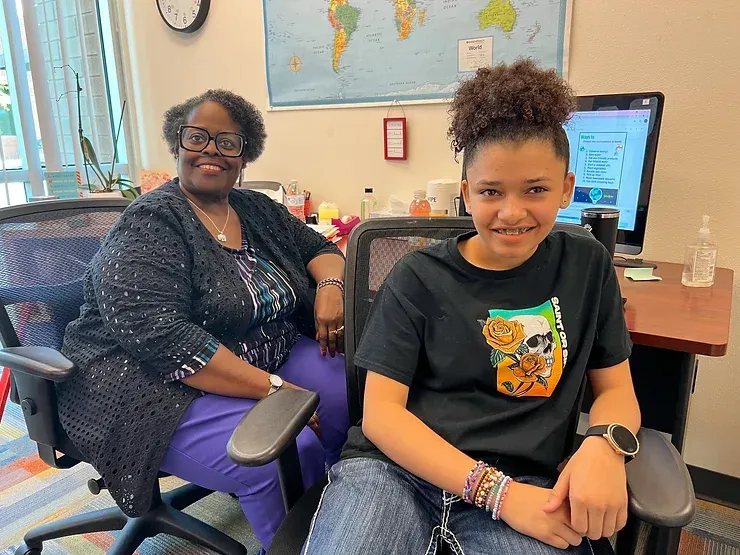Barbara Farland is an English & Social Studies instructor at Brightmont Academy in Plymouth, Minn. She holds a master’s degree in Business Communication from the University of St. Thomas and, prior to pursuing a second career in education, worked as an award-winning public relations and communications professional in both the corporate and nonprofit sectors. As a “storyteller by nature and teacher at heart,” Barbara continues to contribute to various anthologies, among other writing projects.
School Refusal: What It Is and How Personalized Education Can Help
It’s a Monday morning and, as usual, Nora awakens to the chime of her phone alarm. It’s time to get ready for school, but Nora’s parents have a hard time remembering a drama-free morning when she didn’t dawdle, complain of a stomach ache, become really emotional, etc. In fact, Nora hasn’t ridden the bus in two months and has been marked tardy a whopping 21 times. Pair these incidents with six full-day absences this semester, and Nora’s parents feel more than frustrated. They’re legitimately concerned about Nora’s mental health and overall well-being.
And they should be. Nora is among the 2-5 percent of students nationwide who struggle with school refusal—and it’s not to be taken lightly.
What is school refusal? What does it look like? And how can families address the issue of school refusal and overcome its characteristic behaviors and consequences? This is what we know…

School Refusal Defined
First, let’s get this straight: school refusal is not the same as truancy. While those struggling with school refusal stay home and turn inward, truants want to break free from the boundaries of both home and school. In addition, school refusal is characterized by signs of mental distress, while truancy generally has a mischievous aim. In other words, students struggling with school refusal often get wrapped into the poor reputation attributed to truants.
Second, school refusal is not a diagnosis in and of itself. Instead, it’s generally a manifestation of a diagnosable condition, such as depression, adjustment disorder, anxiety, and others. Competent mental health practitioners will know this and treat students accordingly. Students are much more likely to successfully overcome school refusal through therapies geared for the root cause of their behaviors. This, after all, has become the noble cause of the mental health profession.

School Refusal Signs
There’s no rocket science in identifying the signs of school refusal. It is what it is: refusing to go to school. However, the School Avoidance Alliance confirms that school refusal often looks different from kid to kid:
You may notice tearful mornings, physical complaints before school, resistance on specific days, or strong emotional reactions to particular teachers or subjects. Some kids make it to the building but visit the nurse constantly or ask to come home early.
Other signs might be quieter. Maybe your child starts avoiding homework altogether, or you see a sudden drop in academic performance. They might become irritable when school is mentioned, lash out at siblings on weekday mornings, or show an increase in anxiety at night.
The School Avoidance Alliance also suggests being on the lookout for “triggers.” Does a student indicate some level of stress around school related to relationships, sounds, pace, etc.? Do they experience some kind of performance pressure or a tendency toward perfectionism? Do they have separation anxiety? Or have they simply gotten used to staying at home and are having a hard time leaving familiar surroundings and routines? No matter the scenario, it’s legitimate and it’s difficult—but not hopeless.
Working Through—and Out of—School Refusal
Knowing what school refusal is and what causes it doesn’t make it much easier for families to endure it, of course. Education is compulsory in this country, thus the pressure to make sure kids get to school somehow, some way, is real, very real. The trick is finding ways to work through the hardest seasons of school refusal and keep the momentum of routine attendance going. Personalized education has helped many families get back on track and stay on a solid path while they work through the reasons behind their students’ school refusal. Such personalization takes place in five key ways at Brightmont Academy, a full-time private school with 25 campuses across the nation:

- One-to-one instruction
- Much of a student’s refusal may be due to peer interactions and an overall environment that feel overwhelming, difficult, etc. Brightmont’s whole educational premise is built around a one-to-one teacher/student model that helps eliminate classroom distractions and disturbances, and takes into account the precise needs of each student (e.g., more frequent breaks, learning accommodations). In other words, one-to-one instruction often makes the necessity of going to school sound much less scary.
If a student is being reintroduced to school, Brightmont takes special care in devising a plan that allows for them and their family to ease into a new scene and routine. That plan involves choosing a class or classes, a time of day, etc., that will offer the best opportunity for regular attendance and ongoing academic success.
- Flexible scheduling - As families try to get down to the bottom of the reasons behind their children’s refusal to attend school, Brightmont offers much needed flexibility. Even full-time students at Brightmont are able to keep pace with academic requirements with just 3-4 hours of school attendance each day. In addition, Brightmont offers morning, afternoon, and evening time slots to help families arrive at the very best schedules for their kids.
- Summer programming - When school refusal leads to a backlog of missed schoolwork, it’s good to know that Brightmont offers all of its services all year long, including summers. Once students experience a summer at Brightmont, they often opt to enroll as full-time students to help keep the momentum going.
- Skill-building sessions - School refusal may also surface when students feel behind in mastering foundational skills and/or when they struggle with organizing, monitoring, and completing tasks. Brightmont offers skill-building support in math, reading, writing, science, and executive functioning with the aim of growing student confidence and independence.
- Tutoring - Over time, it’s possible that students will want to return to a traditional school setting—and will be more capable of doing so. However, this doesn’t mean that they won’t need ongoing support in tackling their homework. Students can maintain an ongoing relationship with Brightmont—and, most importantly, optimize their academic success—by relying on the school for tutoring.
In a word, school refusal is hard. Both students and parents need help to overcome it—and Brightmont is well equipped to be part of the team that makes it happen. No matter the underlying causes of school refusal and the accommodations that need to be put in place because of it, today’s young people deserve the extra effort. Why refuse to think otherwise?
SOURCE:
More Blog Posts + News













